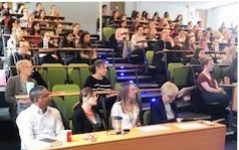All trainee teachers, including those applying for Early Years Teacher Status and School Direct, have to pass the professional skills tests in numeracy before enrolling onto their teacher training programme. For some, this may seem daunting; they may feel rusty, a little unconfident or perhaps insecure on certain maths topics.
The University of Reading has stepped in to support these applicants with a scheme to tackle this confidence gap. By offering free mathematics workshops that are specifically designed to help candidates prepare for the skills test, they hope to boost confidence and also  demonstrate their commitment to their trainees.
demonstrate their commitment to their trainees.
Teaching staff at Reading’s Institute of Education (IoE) are enthusiastic about the scheme. They strongly believe in their trainees’ abilities and have assembled a friendly and approachable team to support them in this essential part of their journey towards becoming a teacher.
The professional numeracy skills test is key for trainee teachers because it is designed to ensure they have the core skills needed to fulfil their professional role in schools. This includes having a good grasp of mental and written arithmetic and written data, alongside topics such as time, fractions, percentages, money and averages.
The free workshops have the added bonus of being held in the beautiful setting of the University’s historic London Road campus. Participants will be able to develop their skills in a welcoming, supportive environment, whilst enjoying the lovely setting of the University’s first home, which is a short walk to the town centre and station.
To book a place or ask any questions, please email us.
numeracyts@reading.ac.uk
INFORMATION ABOUT THE WORKSHOPS FOR CANDIDATES
Quick link to booking a workshop
GETTING STARTED ON THE NUMERACY SKILLS TESTS
This initial taster session will ease you into preparing for your skills test. You will understand the process, become familiar with the style and format of the tests, and go away confident to begin tackling your preparation with advice and guidance to get you started.
Open to: anyone applying to an ITT programme
Dates:
NUMERACY SKILLS TEST WORKSHOPS
These workshops are designed for those needing a little more help in passing their numeracy skills tests.
With two linked sessions you will work through tricky areas, build your fluency and increase your confidence in tackling the mental arithmetic questions.
Open to: anyone who has accepted a place on a University of Reading postgraduate ITT programme and made one attempt at the skills test
Dates:
- Thursday 24 May 2018 18:30-20:00 and Thursday 7 June 2018 18:30-20:00
- Wednesday 4 July 18:30-20:00 and Wednesday 18 July 18:30-20:00
Venue: London Road campus
Cost: Free
Book your place here
numeracyts@reading.ac.uk
For more information, please contact:
Institute of Education
University of Reading
4 Redlands Road
Reading RG1 5EX
numeracyts@reading.ac.uk
(0118) 378 2601




 demonstrate their commitment to their trainees.
demonstrate their commitment to their trainees. 